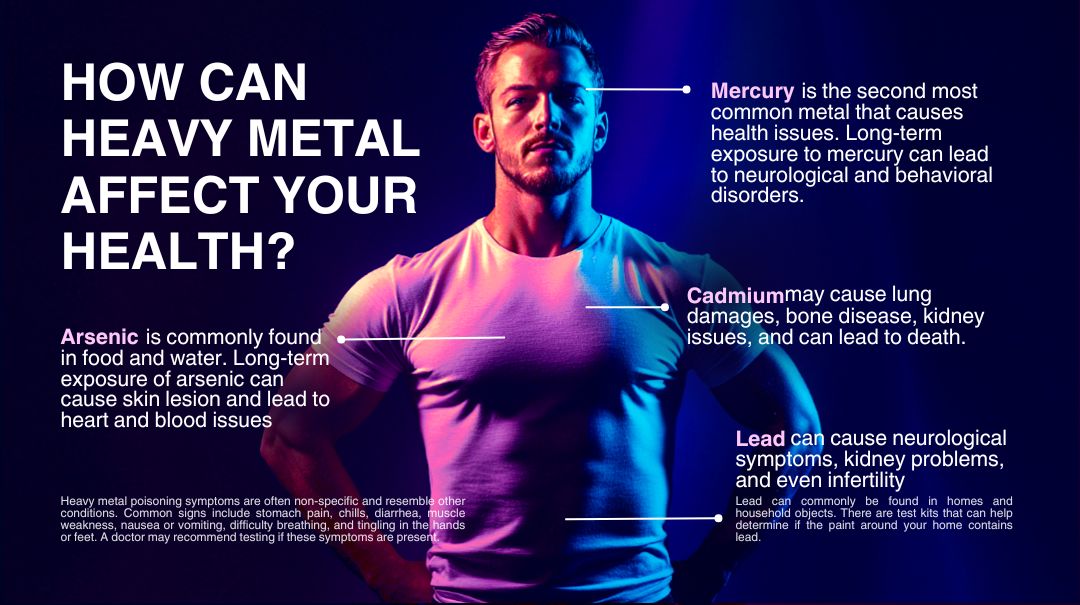Toxic Heavy Metal Test in Bangkok, Pattaya, Phuket, Chiang Mai, Ko Samui (Thailand)
14745
Detect and prevent heavy metal toxicity with advanced screening at PULSE Clinic. Expert care, accurate testing, and tailored detox solutions await you

Toxic Heavy Metal Test in Bangkok, Pattaya, Phuket, Chiang Mai, Ko Samui (Thailand)
Toxic heavy metal screening and detection program to check the level of heavy metals. Screen for toxic heavy metals to better plan your healthcare and detoxification. Get tested at PULSE Clinic and receive your results within 7 days.
Toxic Heavy Metal Test Package at PULSE Clinic
| List of toxins included | Price |
| 7,800 THBResults are available in 7 days |
Book your appointment today!
Contact us at info.bkk@pulse-clinic.com or chat on your preferred platform:
![]() +66 65 237 1936
+66 65 237 1936  @PULSEClinic
@PULSEClinic ![]() PulseClinic
PulseClinic
What is Toxic Heavy Metal?
Heavy metal poisoning occurs when you're exposed to metals like lead, mercury, or arsenic. These metals bind to cellular components, interfering with organ function. The symptoms can be severe, potentially life-threatening, and may lead to permanent damage.

General Information About Heavy Metal Testing
Testing for toxic heavy metals can be done through various methods, including blood, urine, or sweat tests. Blood testing is the most common approach, as it is quick, convenient, and provides accurate results.
Preparing Yourself for a Heavy Metal Blood Test
You don't need to fast before this type of blood test. However, seafood consumption might affect the accuracy of the test, because eating seafood can temporarily increase the heavy metal level in your system. You must refrain from eating seafood for at least 72 hours (3 days) before your test.
Add us on Line and stay in touch.
Common Sources of Heavy Metal Exposure
- Drinking water, seafood, vegetables, and fruits
- Air pollution, such as emissions from factories or vehicle traffic
Examples of Heavy Metals Found in Daily Life
- Aluminum: present in soil, airborne dust, drinking water, food, containers, medications, and deodorants.
- Arsenic: Used in agriculture and dyeing industries.
- Mercury: Found in areas with fuel combustion, metal and cement factories, and dental fillings.
- Lead: Common in industrial zones and can contaminate soil, air, and water.
- Cadmium: Found in zinc and lead mines, industrial areas, tobacco, cigarettes, plastics, and rubber.
Who Should Consider Heavy Metal Testing?
- Individuals with unexplained symptoms such as weight loss resistance, hormonal imbalances, fatigue, numbness, or anaemia, which might be linked to heavy metal toxicity.
- People living in toxic environments or near industrial factories.
- Workers exposed to hazardous substances, such as those in battery production, goldsmithing, or welding.
- Individuals are frequently outdoors and exposed to pollution.
- Those who dine out often, potentially consuming contaminated food.
- Regular users of hair dyes or nail products, which may contain toxic metals.
Important Information Before Deciding
Testing for heavy metals in the body is not a treatment but an assessment to determine whether harmful levels of toxic metals are present. The results serve as a guide for health management and detoxification.
Exposure to heavy metals doesn’t always cause immediate illness, but these substances can accumulate over time, leading to gradual disruptions in various bodily systems. This accumulation may eventually result in serious conditions like cancer, high blood pressure, or kidney failure.
Book your appointment today!
Contact us at info.bkk@pulse-clinic.com or chat on your preferred platform:
Add us on Line and stay in touch.
Loading...
Clinic Locations
Loading...



